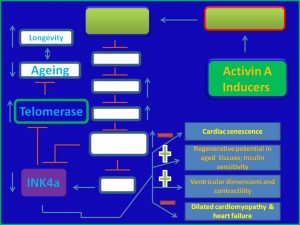Introduction: What they say
A recent study from the Stem Cell Aging Group, Centro Nacional de Investigaciones Cardiovasculares, E-28029 Madrid, Spain shows that “Bmi1 limits dilated cardiomyopathy and heart failure by inhibiting cardiac senescence.” This study was published in the online journal 9 March 2015 issue of Nature Communications by Prof Gonzalez, Gonzalez-Valdes and others.
What we say:
On the foundation of this interesting finding, Dr L Boominathan PhD, Director-cum-chief Scientist of GBMD, reports that: Cardiac rejuvenation therapy: Activin A suppresses tumor suppressor INK4a/p16 expression, and inhibits dilated cardiomyopathy and heart failure via up regulation of its target gene
From the Significance of the study to Public health relevance:
Given that: (1) cardiovascular disease is the leading cause of death worldwide; (2) Dilated cardiomyopathy is the leading cause of Heart failure; (3) the raise of death rate, due to cardiovascular disease, has increased from 12.3 million in 1990 to 17.3 million in 2013; (4) 13% of cardiovascular disease occur due to uncontrolled high blood pressure; (5) in India, in 2004, 14.6 lakhs deaths (14% of total deaths) were due to ischemic heart disease; (6) 85% of people over 80 years are susceptible to cardiovascular diseases; (7) the global economic cost spent in the treatment of cardiovascular disease in 2011 was little more than 10 billion US dollars; (8) the death due to cardiovascular disease is higher in low-to-middle income countries compared to developed countries; and (9) an alarming number of people, such as 230 lakhs people, will die from cardiovascular diseases each year by 2030, there is an urgent need to find: (i) a cure to diseases, as mentioned above, leading to cardiovascular disease; (ii) a way to induce regeneration of adult cardiomyocytes that were lost in Myocardial patients; (iii) a cheaper alternative to the existing expensive drugs; and (iv) a side-effect-free Natural product-based drug.
From research findings to therapeutic opportunity:
This study suggests, for the first time, that Activin A, by increasing the expression of its target gene, it may suppress the expression of tumor suppressor and the ageing marker INK4a/p16 (figure 1).
Thereby, it may: (1) inhibit cardiac senescence; (2) increase of regenerative potential in aged tissues; (3) improve ventricular dimensions and contractility; (4) increase insulin sensitivity; (5) increase telomerase expression; (6) decelerate ageing process; and (7) promote longevity. Thus, (1) by treating myocardial patients with Activin A inducers, one may prevent Dilated cardiomyopathy and ageing-associated (or, stress-associated) decline in cardiac function; and (2) pharmacological formulations encompassing “Activin A inducers or Activin A inducers plus any of the known drugs that inhibit cardiomyopathy“ may be used to inhibit dilated cardiomyopathy and heart failure (figure 1).

Details of the research findings:
Idea Proposed/Formulated (with experimental evidence) by: Dr L Boominathan Ph.D.
Terms & Conditions apply http://genomediscovery.org/registration/terms-and-conditions/
Undisclosed mechanistic information: How Activin A suppresses the expression of tumor suppressor INK4a/p16.
# Research cooperation
Amount: $100
For purchase and payment details, you may reach us at admin@genomediscovery.org
References:
Web: http://genomediscovery.org or newbioideas.com
Citation: Boominathan, L., Cardiac rejuvenation therapy: Activin A suppresses tumor suppressor INK4a/p16 expression, and inhibits dilated cardiomyopathy and heart failure via up regulation of its target gene, 31/January/2017, 11.30 pm, Genome-2-Bio-Medicine Discovery center (GBMD), http://genomediscovery.org
Courtesy: When you cite drop us a line at info@genomediscovery.org


